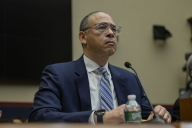You have /5 articles left.
Sign up for a free account or log in.
Have you had the experience recently of your physician turning her computer screen toward you and googling something she needs to know? I have, twice in a month, and I have to say, it was a little disconcerting.
I thought the natural order was that patients, hungry for any scrap of information about their health, googled and read up on medical topics so they could ask dumb questions of their doctors. The doctors, playing their parts, were supposed to say in stentorian tones, “No, that’s a common misconception. You must have been reading the Wikipedia entry for dysbaric osteonecrosis!” After all, don’t they teach things in med school that you can’t learn in the first dozen hits of an online search?
But both my family doctor and a neurosurgeon (I’m fine) googled things for me as I sat with them recently and looked on. The brain surgeon in particular thought Wikipedia is great. He said he makes his interns use it when they ask questions, and then he proceeded to give me an hour of basic instruction on Internet use. (He also said doctors don’t have to be very smart, they just need good memories, and admitted he had no idea what many of the medical terms meant on the Wiki entry he was looking up.) Hey, I am the Internet, pal, I wanted to tell him, but he had knives and loves to use them.
I use Google, Wikipedia, and other first-responder tools all the time, but I do know my way around a library and have enough research experience to have a feel for when a source is adequate. For instance, I needed to remind myself today which year women’s suffrage was enacted—an important fact to get right but one that’s easy to check (and crosscheck, if you want).
On the other hand, I wanted the lyrics to a song called “Make Believe” from the early ‘20s. It wasn’t all that important to my book, but I wanted it. Felt that need? It’s like the hunger for air during a breath-hold. Not only could I not find it easily online, I fell down that familiar well of context—who wrote the lyrics, what else he penned, who he worked with, what sorts of things he wrote about, etc. And I never could pin down the difference between “Make Believe” and something called “Make Believe and Smile,” leaving me wondering if the latter was the extended title, or something else entirely, or just a mistake. Any time there’s a hitch like this, I slow way, way down, even for something trivial, and get myself to the shelves (or change it to something I know).
But you should hear English TAs on the subject of Wikipedia. Hoo-ah. We must fight it with all means at our disposal, by which they mean verbally denouncing all open-content sources to the rhet classes they’re teaching. Then they ban it from the research and writing process. One young guy was so disturbed by the various drafts that he tracked over time for the entry on Auburn University that he couldn’t speak of them calmly, and couldn’t shut off, so on several occasions he finished with his class and came into his group office raging at anyone who would listen.
After my experience with the doctors, I’ve felt less self-conscious about my constant but measured use of online sources including Wikipedia. I noted today that in the August 2008 issue of American Libraries, the magazine of the American Library Association, several people weigh in on its use, including the editor, a feature writer, and professional librarian readers. They’re all in favor of it, especially as a “centerpiece around which to teach searching and critical reading skills, as well as evaluation of a resource’s content,” as the author of the article “Dissecting the Web Through Wikipedia” says. Adam Bennington asks us to
Embrace the enemy: In the end, students are going to use Wikipedia anyway. If they don’t access it from school, they will look at it from home or another library. If they don’t cite it directly in a paper, they will probably have at least looked at an entry, and it may wind up influencing them. Librarians and other educators may as well capitalize on the opportunity to use the resource as a teaching example as well as to make the profession and its skills more relevant to students…. Evaluating resources they find through Google or Wikipedia will be critical when using that information to make decisions.
Let’s get this thing going then. I want my doctors to have the best possible skills for diagnosing by Wikipedia.






